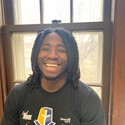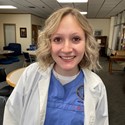MMU Advances Mental Health Care Through Program and Wellness Conference
January 26, 2023
Jesse Bailey really only cared about baseball until he met Lori Lincoln.
"I was a baseball player. That was my main focus in college," said Bailey, who came to Mount Marty University with a few years of collegiate baseball eligibility left.
Shortly after arriving in Yankton, the Eau Claire, Wisconsin native found himself in the middle of a "difficult conversation" with Lincoln, an associate professor of psychology in MMU's Social Sciences Department. Though it wasn't the first talking to he'd gotten about his future. Bailey's still not sure why, but this time, he was ready to listen.
"She didn’t say ‘you aren’t good enough’ or ‘you know you’re not going to make it huge,’” he recalls. “She encouraged me to be realistic. ‘What if baseball isn’t an option? You need to have a career to fall back on.'"
Lincoln set Bailey up to volunteer with the Boys & Girls Club of Yankton, where he’d eventually complete all 160 of the service learning hours required of MMU Human Services students.
“I loved it,” he said. “Somehow, I resonated with the youth. I got along with the other employees there, and once my service learning was done, I became an employee.”
And that was that.
Eventually, Bailey was overseeing the entire Yankton branch. He took a break from his MMU studies to continue his work in the non-profit sector, but Lincoln never gave up on him.
"She’d say ‘when are you coming back to finish? I want you back in the classroom,’” Bailey said.
The persistence paid off. Bailey graduated in 2016 and jumped right back into community-focused social service, this time as the executive director of Pathways Shelter for the Homeless in Yankton. Under his watch, the shelter has expanded from nine beds to 84 and remains in expansion mode. Among the goals? Cut the 50-person waiting list to zero.
It all began with support—and a little push—from MMU's Human Services instructors and the community it serves.
"She deserves a raise,” he said of his former advisor. “You can put that in bold print.”
Guiding careers, supporting community
Lincoln sees Bailey's career as a major success story, and not just for his individual accomplishments. It's a story that's representative of MMU's unique role in a community with a wide footprint and outsized expertise in the human services arena.
The department's psychology and human service curricula prepare students for careers in fields like drug and alcohol counseling, school counseling, marriage and family therapy, case management or juvenile justice. But MMU's service learning and internship requirements also benefit community agencies like the South Dakota Human Services Center (HSC), the First Judicial Circuit’s Court Services office, Lewis & Clark Behavioral Health Services, the Boys & Girls Club, and Bailey's shelter, which now counts itself as an option for service learning.
Mount Marty trains many of the professionals who staff those facilities, but it also helps those professionals maintain their licenses and stay up-to-date with best practices. In June of 2022, the school once again helped organize the Yankton Area Mental Wellness Conference, which offers locals a chance to earn continuing education credits without heading out of town.
It also serves as a source of rejuvenation for counselors, case managers and others in the mental wellness space.
"For people who need those continuing education credits to maintain their certifications, this provides the opportunity to be able to earn those locally," said Lincoln, who's been involved in the conference for 24 years. "Now, the benefit has really evolved in that people enjoy having the opportunity to collaborate with their peers in a regional setting. I really love the interagency, interdisciplinary aspect of working with these other facilities and agencies in the community. That, to me, is the true strength of this."
Meeting needs with an eye to the future
Professionals guide the topic selection at the conference based on where they see the needs in South Dakota. In 2022, for example, there was a session titled "Conversations on Cannabis," a hat tip to South Dakotans' 2020 vote to legalize the drug for medicinal and recreational use (the latter of which fell to a court challenge in 2021). It also included rundowns on state-level juvenile justice reform efforts, the recently adopted 988 National Suicide Prevention Hotline, the opioid crisis and school shooting drills.
"A lot of the planning is from people that have first-hand knowledge of what clients need," said MMU Psychology Professor Alan Ferris. "They're working with the legislature in Pierre, they know who's walking through the doors of their counseling centers. They can say 'this is an issue I'm seeing a lot of.'"
The conference is just one example of the ways MMU's Social Sciences Department works to stay responsive in a rapidly evolving discipline. The list of available career paths has grown alongside public awareness. Ferris and Lincoln now advise students who aim for jobs in sports psychology, for example, which focuses on improving the mental wellness of athletes to optimize performance.
Even so, Ferris said, mental illness topics continue to carry a stigma in some areas, particularly rural ones where treatment options may be several hours away. Ferris is currently gathering information for a research project on the roots of drug and alcohol culture in the rural Midwest.
"It's not researched a lot in this country because it's hard to get to people in rural areas," he said. "If you grew up in a small town in the Midwest, you're exposed to that alcohol culture when you're growing up. We don't have a lot of models out there to help people get to healthier options."
Ferris is also part of a strategic Mount Marty initiative on rural mental health, for which representatives from various departments meet to discuss research and grant opportunities that might help expand access.
And that, of course, is the purpose of social sciences—to improve society at large by tackling some of its most pressing human problems. For Bailey, that meant connecting to a Yankton community he'd initially seen as a way station on his path to baseball glory and growing to appreciate the feeling of selfless service.
His Mount Marty experience and the embrace of the town he now calls home have translated into a rewarding career.
"There are so many volunteers in the community. It just really made me want to stay here and be a part of that," Bailey said. "They were so welcoming to me as an outsider who didn't grow up here. I want to give back to the community that helped me find my path."







